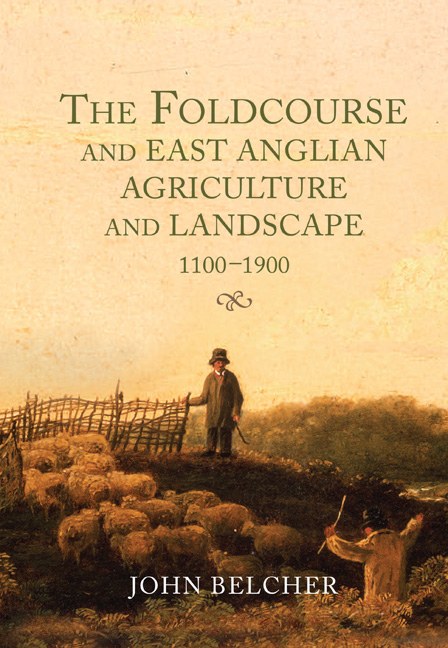Book contents
- Frontmatter
- Contents
- List of Illustrations
- Acknowledgements
- List of Abbreviations
- Introduction
- Chapter 1 The Contexts of the Foldcourse
- Chapter 2 Manors, Rights and Customs of the Foldcourse
- Chapter 3 The Medieval Foldcourse
- Chapter 4 The Late Medieval Evolution of Foldcourse Husbandry
- Chapter 5 The Agricultural Practice of Foldcourse Husbandry
- Chapter 6 The Foldcourse and Improvement
- Conclusions
- Glossary
- Bibliography
- Index
- Garden and Landscape History
Chapter 3 - The Medieval Foldcourse
Published online by Cambridge University Press: 26 March 2021
- Frontmatter
- Contents
- List of Illustrations
- Acknowledgements
- List of Abbreviations
- Introduction
- Chapter 1 The Contexts of the Foldcourse
- Chapter 2 Manors, Rights and Customs of the Foldcourse
- Chapter 3 The Medieval Foldcourse
- Chapter 4 The Late Medieval Evolution of Foldcourse Husbandry
- Chapter 5 The Agricultural Practice of Foldcourse Husbandry
- Chapter 6 The Foldcourse and Improvement
- Conclusions
- Glossary
- Bibliography
- Index
- Garden and Landscape History
Summary
The sheep fold was for many centuries a critical agrarian resource for the maintenance of the fertility of the soil. Furthermore, it was a significant and valuable property – for, as Frederic Maitland expressed it: “the demand for manure has played a large part in history” – which meant that it was entangled with ownership and rights, rights that could be enforced, abused and alienated, and was a “jealously guarded [and] valuable asset” by the twelfth century. Many of the discussions concerning foldcourse husbandry and the fold have centred around the classic foldcourse of the early modern period. However, in this chapter the intention is to explore the origins and evolution of the foldcourse. The opening section examines the use of the term ‘fold’ in Domesday Book and considers why that use is skewed towards Norfolk and Suffolk. This is followed by an exploration of the ownership and agricultural operation of the fold in the medieval period, together with a more detailed examination of the folding arrangements in three townships during the same period.
DOMESDAY AND THE FOLD
The Norman conquest and the subsequent regime change were once considered catastrophic. However, there was a degree of continuity between the old regime and the new – for example, the well-run pre-conquest state and its efficient tax system continued to function – and the greatest impact for most of the population was the exchange of a Saxon lord for a Norman one, and the development of a feudal society. The resulting hierarchical change was rooted in the “dependence” of one man on another, from the crown through the greater and lesser noblemen to “a base constituted of the mass of the peasantry”. Each layer of this hierarchy was linked, through a network of services and obligations, to the one above. A significant impact of this change was the upheaval brought about by the remodelling of the agrarian landscape to suit the needs of the new seigneurial class, an upheaval characterised by Christopher Dyer as “the largest transfer of property … in English history”, and a rearrangement illustrated in part by the creation of the Domesday Book.
This general picture does, to some degree, break down in East Anglia, and the following will examine the impact and consequences of the changes outlined above viewed through the context of the fold and the references to it in the Domesday Book (where the term occurs fifty-seven times).
- Type
- Chapter
- Information
- Publisher: Boydell & BrewerPrint publication year: 2020



